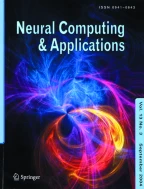Abstract
A neural network trained with clustered data has been applied to the extraction of temperature from vibrational Coherent Anti-Stokes Raman (CARS) spectra of nitrogen. CARS is a non-intrusive thermometry technique applied in practical combustors in industry. The advantages of clustering of training data over training with unprocessed calculated spectra is described. The method is applied to CARS data from an isothermal furnace and a liquid kerosene fuelled aeroengine combustor sector rig. Resulting temperatures have been compared with values extracted from the data using conventional least squares fitting and, where possible, mean temperatures measured by pyrometer and blackbody cavity probe. The main advantage of the neural network method is speed, with the potential for online temperature extraction at the spectral acquisition rate of 10 Hz using standard PC hardware.
Similar content being viewed by others
Explore related subjects
Discover the latest articles, news and stories from top researchers in related subjects.References
Eckbreth AC. Laser diagnostics for combustion temperature and species. In: Gupta AK, Lilley DG (eds),Energy and Engineering Science Series. Abacus Press, Tunbridge Wells, 1988.
Luckerath R, Woyde M, Meier W, Stricker W, Schnell U, Magel H-C, Gorres J, Spliethoff H, Maier H. Comparison of CARS thermometry with thermocouple measurements and model predictions in both naturalgas and coal-dust flames. Appl Opt 1995; 34: 3303–3312.
Eckbreth AC. CARS thermometry in practical combustors. Combust Flame 1980; 39: 133–147.
Stenhouse IA, Williams DR, Cole JB, Swords MD. CARS measurements in an internal combustion engine. Appl Opt 1979; 18: 3819.
Black JD, Brocklehurst HT, Priddin CH. Non-intrusive thermometry in liquid kerosene fuelled combustor sector rigs using coherent anti-Stokes Raman (CARS) and comparison with CFD temperature predictions. ASME Paper 96-GT-185, International Gas Turbine and Aeroengine Congress and Exhibition, Birmingham, UK, June 10–13 1996.
Magre P, Moreau P, Poirot M. CARS Temperature Measurements on a RQL Combustor: Technical Report RT 8/3608 EY, ONERA, 29 Avenue de la Division Leclerc, 92320 Chatillon, France.
Fessenden RJ and Gyorgyi L. Indentifying functional groups in IR spectra using an artificial neural network. J Chem Soc Perkin Trans 1991; 2: 1755–1762.
Carrieri AH, Lim PL. Neural network pattern recognition of thermal-signature spectra for chemical defense. Appl Opt 1995; 34: 2623–2635.
Black JD, Kerr NC. Application of neural networks in the analysis of Coherent Anti-Stokes Raman spectra. In: Castellucci EM, Righini R, Foggi P (eds).Coherent Raman Spectroscopy. World Scientific, Singapore, 1992.
Lockett RD. CARS temperature measurements and chemical kinetic modelling of auto-ignition in a methanol fuelled internal combustion engine. PhD Thesis, University of Capetown, South Africa, 1992.
Silvester CF. Neural Network Interpretation of CARS Spectra. Rolls-Royce report number RR(OH)1309, 1995.
Devonshire R, Dring IS, Hoey G, Porter FM, Williams DR, Greenhalgh DA. Accurate CARS measurement and fluid-flow modelling of the temperature distribution around a linear incandescent filament. Chem Phys Lett 1986; 129: 191.
Mansour MK. PhD Thesis, University of Sheffield, 1992.
Author information
Authors and Affiliations
Rights and permissions
About this article
Cite this article
van der Steen, H.J.L., Black, J.D. Temperature analysis of Coherent Anti-Stokes Raman spectra using a neural network approach. Neural Comput & Applic 5, 248–257 (1997). https://doi.org/10.1007/BF01424230
Issue Date:
DOI: https://doi.org/10.1007/BF01424230
